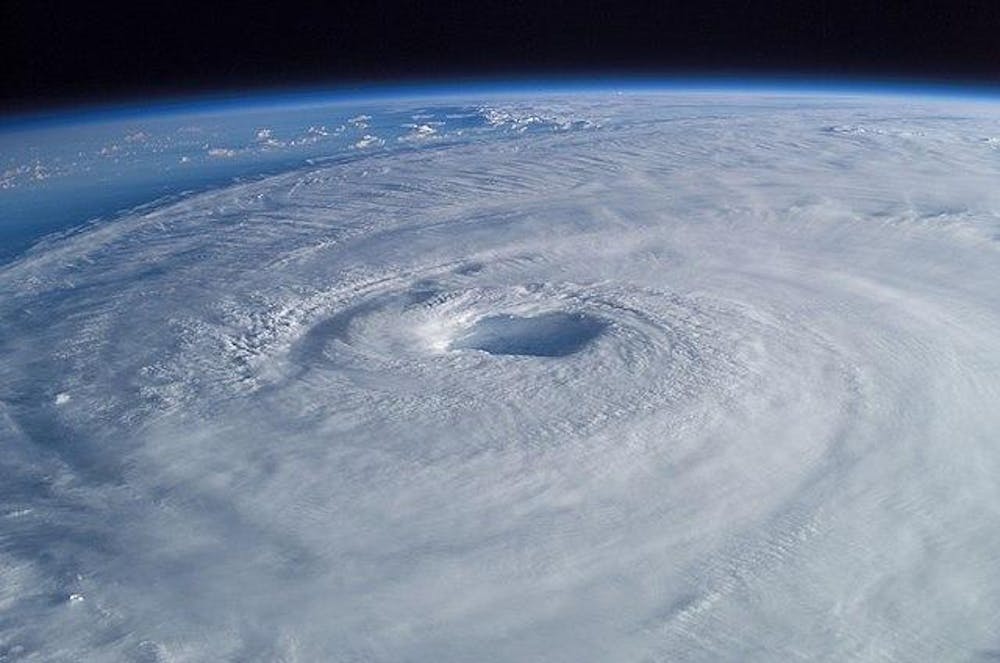About 100 years ago, Hurricane Helene would not have been Helene. Instead, the storm would have been named a string of numbers identifying a specific coordinate for the location at which it first struck — fun, right? While Hurricane 30.1116° N, 83.5821° W is certainly less catchy, the effects of hurricane nomenclature have roots much deeper than what is shown on the surface. We can no longer ignore how our biases have influenced hurricane nomenclature throughout history, and how the current system of gendered hurricane names impacts our emergency responses. When hurricanes named after women result in greater damage than those named after men, it is not because of the hysterics of a woman, it is because of a set of deeply ingrained implicit biases contrasting the nature of women and men.
Humans have an innate desire to name things. It is common to give names to cars, phones and even kitchen appliances. By applying human attributes to objects, we increase our comfortability and familiarity with them. The same concept extends to hurricanes — in a name, we convert the unknown into a tangible concept, encapsulating the wild and unpredictable force of a hurricane into a more palatable label. By personifying hurricanes, people likely draw on their own individual associations, reducing their true fears to prejudiced simplifications. Helene is a grandma in plaid baking biscuits for her grandchildren, not a storm wreaking havoc through cities across the coast, and perhaps we like it better that way.
Naming hurricanes as women started in the 1890s with Clement Wragge, an Australian meteorologist who spent hours tracking winds and belittling them by naming them after women in his life and female public figures he disliked. Those temperamental and unpredictable winds really reminded him of politicians.
This method of naming hurricanes gained widespread use in the 1950s after an attempt to name them phonetically fell short (people remembered there are only 26 letters in the alphabet.) In 1953, the United States returned to only female names for hurricanes. While the reason for this switch is unclear, some sources suggest it could be due to the maritime tradition of referring to the ocean as a female. In designating a gender for this unstoppable force, meteorologists began to lean into gendered cliches and stereotypes. Weather reports described hurricanes as temperamental forces “flirting” with the coastline. This belittled an uncontrollable force of nature to fit stereotypes of women in the ‘50s, thus revealing the underlying degrading and disparaging perceptions of contemporary women. These tropical storms are made to mirror the ghosts of a narrative of hysteric women and their unpredictability.
It was for this reason that the feminist movement pushed back against this misogynistic nomenclature system. Led by activists such as Roxcy Bolton, the movement advocated for an equal split of female and male names. In 1979, campaigns for equal naming of hurricanes between both sexes were successful, and the World Meteorological Organization started using both male and female names.
In doing so, another problem arose: There are discrepancies between how people perceive and respond to threats posed by female-named versus male-named hurricanes. A 2014 literature review concluded that, over the last six decades, the damage from hurricanes named after females was significantly greater than that of the male hurricanes because people perceive female-named hurricanes to be less dangerous than male-named hurricanes. This issue is still seen today: A 2023 review also concluded significant linguistic differences in reporting of female and male-named hurricanes — in terms of both the disaster itself as well as later relief efforts — impacting public response to the hurricane. These biases are so deeply entrenched in many individuals’ subconscious perceptions of the world around them that involving them in a situation so reliant on our emergency responses and subconscious associations has real and often fatal consequences. Many people are less prepared for female-named hurricanes, resulting in greater damage. The decreased sense of urgency due to the lower perceived threat of hurricanes named after females is real-life fruition of gender bias associations.
Over the last few weeks, this damage has become a real experience for so many. Helene is no longer a grandma baking cookies — she wrecked homes and turned streets into murky brown canals. Sources placed the death count from Helene at over 230 people. The torrential downpour and flash floods that took hundreds of lives took people by surprise, and many locals were not anticipating the extent of this damage. We cannot afford to let natural disasters such as Helene take us by surprise, especially given the likelihood of increased intensity because of climate change. Contrastingly, locals in Florida were prepared for the worst prior to Hurricane Milton’s landfall shortly after Helene largely caught them by surprise. While this may not be driven entirely by gender, due to differences in categorization in the days leading up to landfall, biases in gender perception could exacerbate differences in the preparation prior to these hurricanes. It could take us decades to reverse and mitigate gender-based biases and associations for names, but we cannot waste any more time underestimating these hysterical storms — we must abandon gender-based names altogether.
This convoluted past demonstrates the extent of the impact of language and names on public perception of the world around us. Language reflects social values and norms and has an influence on communal and individual behaviour. It is time meteorologists return to the less catchy coordinates titles for hurricanes. With all of the biases involved in the perception of names and the attributes we associate with different names, the only solution is numbers. After all, nobody is going to take a hurricane named after a grandma playing bridge seriously.
Antara Goplan (28C) is from Walton-on-Thames, England.






